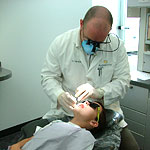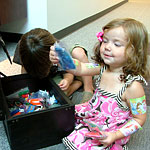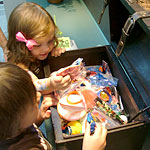EARLY TREATMENT
We welcome your child to Buzbee Dental for the very first time by scheduling them a "Happy Visit."
Learn more below.



-
At your child's first visit, we will help them feel comfortable by:
-
Giving them a new toothbrush, toothpaste and floss to use at home
-
Letting them pick a prize from our treasure chest
-
Taking their picture with their dentist to capture their "First Visit to the Dentist!" (Be sure to tag us in the photo!)
-
Counting their teeth
-
Teaching them about dental instruments we use
-
Encouraging healthy habits
Why Baby Teeth Matter
Baby teeth, also called primary teeth, are just as important as permanent (adult) teeth and are very important to your child’s health and development. They help him or her chew, speak and smile. Cavities in baby teeth can be repaired with fillings, which prevent an infection from causing pain, spreading, and requiring the removal of the tooth. They also hold space in the jaws for permanent teeth that are growing under the gums. When a baby tooth is lost too early, the permanent teeth can drift into the empty space and make it difficult for other adult teeth to find room when they come in. This can make teeth crooked or crowded and lead to future orthodontic problems.
The best way to avoid cavities in baby teeth is through prevention.
Prepare Your Child
If possible, schedule morning appointments, when young children are alert and fresh. Try to avoid nap or meal times.
Prepare a preschooler or older child for the visit by giving him or her a general idea of what to expect. Explain why it is important to go to the dentist. Build excitement and understanding.
Prepare Yourself
Stay Positive! If you have dental anxieties, be careful not to relate those fears or dislikes to the child. Parents need to provide moral support by staying calm while in the dental exam room. Children can pick up parents' anxieties and become anxious themselves.
The First Visit
When you and your child are comfortably seated in the office, we'll spend a few minutes getting to know each other and explaining what we will be doing. We may show a video about brushing teeth and oral health. Then, we'll perform a gentle examination of the mouth. We will be looking for any early signs of dental problems such as tooth decay, and assessing the risk that your child may develop the disease in the future. Often, this kind of risk assessment can help us prevent — and even reverse — the early stages of tooth decay, without any drilling. If possible, we will perform a cleaning, fluoride treatment, and x-rays as well.
Finally, we'll discuss various ways to keep your child's oral health in top condition. For instance, we may talk about how diet, eating habits, and oral hygiene practices can help prevent tooth decay, the most common chronic disease of childhood. That's an important subject for everyone — even more so if your child is at greater risk. If any treatments (such as fluoride) are needed, we will explain what they are and why we recommend them. We will also review tips on cleaning and brushing effectively, and we'll schedule a follow-up visit as required.
Protect Your Child's Teeth at Home
- Before teeth erupt, clean gums with a clean, damp cloth.
- Brush teeth with a small, soft-bristled toothbrush. Introduce a pea-sized dab of fluoridated toothpaste after 2 years of age, once the child is old enough to spit out the toothpaste after brushing.
- Prevent baby bottle tooth decay: Don't give children a bottle of milk, juice or sweetened liquid at bedtime or when put down to nap.
- Limit the time your child has a bottle. Your child should empty a bottle in 5 to 6 minutes or less.
- Help your child brush his or her own teeth until 6 years of age. Allow the child to watch you brush, and follow the same brushing pattern to minimize missed spots.
- Avoid foods and treats that increase tooth decay: hard or sticky candies, fruit leather, and sweetened drinks and juice. Offer fruit rather than juice; the fiber in fruit tends to scrape the teeth clean, whereas juice just exposes the teeth to sugar.

